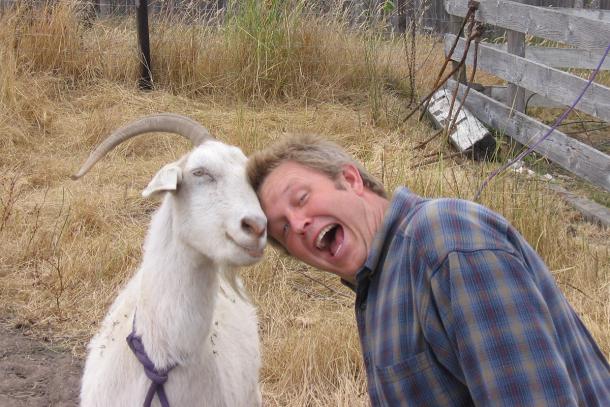Thank You, Dexter!
May 27, 2016
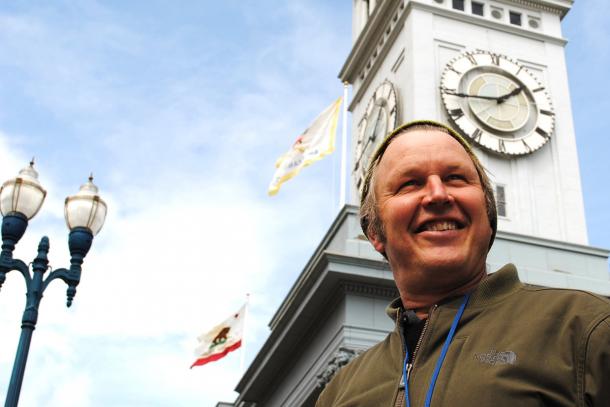
It takes a rare and special breed to be a farmers market manager: arriving at 5:00 am on a rainy December morning to help set up the market; navigating permits, requests, and surprise inspections from various city officials; and patiently fielding questions and concerns from countless sellers and shoppers day after day.
But as Co-Director of Market Operations Dexter Carmichael puts it, it sure can be “crazy fun.”
With a decades-long dedication to sustainable farmers, Dexter’s behind-the-scenes orchestrations have brought stability to the ever-evolving Ferry Plaza Farmers Market, from its early days on the Embarcadero to its move to Green Street (during redevelopment of the waterfront) to its last 13 years thriving at the Ferry Building. Through it all, he’s supported significant growth in CUESA’s markets and educational programming, and provided an important bridge through three executive director transitions, stepping up to act as our interim Executive Director in 2014.
In partnership with Co-Director Lulu Meyer, Dexter has gracefully juggled the needs of 120 small businesses, tens of thousands of shoppers, and multiple stakeholders at the Ferry Building. And he’s done it all in stride, with an attentive ear, an infectious laugh, and a generous smile.
After 15 years with CUESA, Dexter is moving on to the next stage of his career, working directly with farmers in the field. It is a bittersweet farewell for all of us. We are so grateful for his contributions to CUESA and the market community, and wish him the best in what lies ahead.
Dexter sat down with us to share some reflections from his crazy ride at the farmers market.
How did you originally get involved with farmers markets, and wind up at CUESA?
I was working in restaurants in the early 1980s, when I was introduced to Sibella [Kraus, who later became CUESA’s founder]. Alice Waters had asked Sibella to start the Farm-Restaurant Project, and she needed someone to pick up produce from farmers, so I did that a number of times. Then when I decided to move to SF, Sibella was working with Greenleaf Produce, a produce distributor for restaurants. They hired me to run their specialty organic department, and that’s where I got introduced to a lot of small farmers.
In 1994, Sibella needed help with the new Ferry Plaza Farmers Market, so I came in and helped set up the market info booth and the “Market Cooking for Kids” and “Shop with the Chef” demos. Then I got a full-time position at Whole Foods and left for a few years. In 1999, Sibella asked if I wanted to run the market, so I left Whole Foods and became the market manager when it was on Green Street.
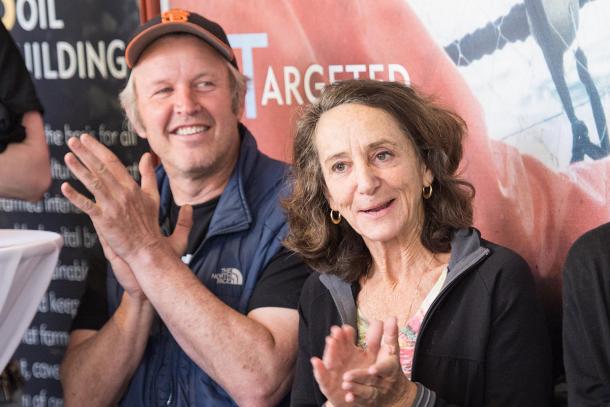
What challenges and changes have you dealt with at the farmers market over the years?
The Ferry Plaza Farmers Market was the third farmers market in San Francisco; now there are close to 30. The farmers market scene has mirrored the rapid, exponential growth of the city, with all its uncertainties. I’ve been very lucky to be at this market. Most farmers markets are in parking lots, parks, or the street. All the markets are great, but this one is in a special location.
Being at an iconic building presents unique opportunities and difficulties. You have to interface with all these different agencies: BCDC, the Port, the Fire Department, the Police Department, Coast Guard, National Security, BART. At times it’s been pretty heady, with the Super Bowl and stuff like that. The transition from Green Street to the more complicated situation at the Ferry Building was also jarring for the community. It happened during a period of rapid change and gentrification in SF. But food is a glue within our culture. The exceptional rebuild of the Ferry Building into a food hall and the growth of the farmers market in conjunction with that was a pretty powerful way to bring people together.
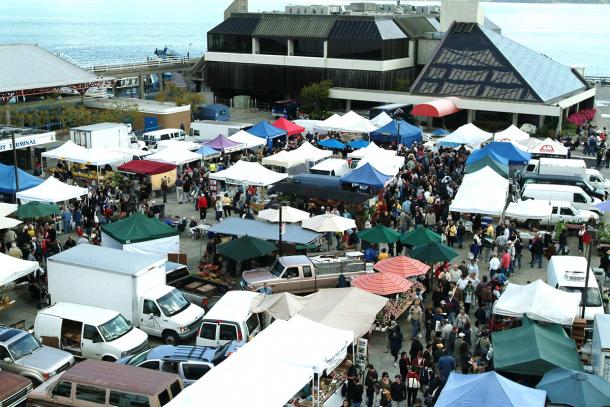
How has your role evolved?
It was a mature market when I came on, and I have always felt like more of a caretaker. Some of the early managers brought in the great core, original group of sellers. We’re now a generation or two away from many of those people, but the market still has that quality associated with it, and so many high-integrity growers.
As market manager, my job is to make things operate. We got stuff thrown our way constantly, but the point was the show had to go on. It was not just for CUESA. It was for people’s livelihoods and for the community. That’s one of the biggest difficulties with market management. There’s a potentially high burnout factor. But I can’t deny the joy it has brought me. It has been the craziest show I’ve ever seen.
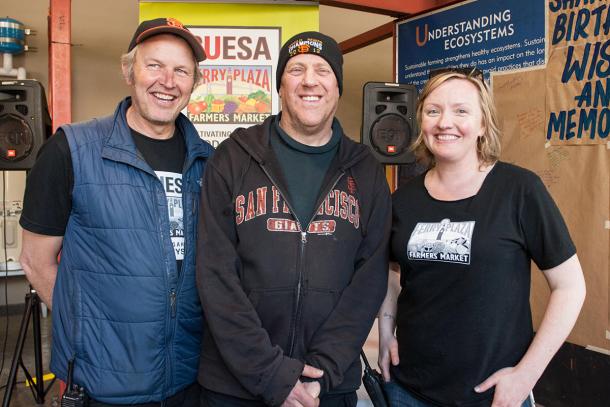
Are there any particular memories that stand out?
It’s hard to find one memory. The peculiarities of Green Street: it’s a parking lot, and I’ve seen some rains go through there. Or the crazy mix of sellers I packed in there at points, then rearranging them at the Ferry Building to make it work. Overall, I enjoyed piecing new sellers into the market fabric, and it’s really been a lot of fun doing that with Lulu [Meyer, Co-Director of Operations]. When she came on, she brought in the street food and had a different perspective on the whole restaurant aspect.
I give kudos to Sibella for the core vision for this organization, with the farmers market as an educational resource. I remember too many sellers to name, including some who are no longer with us like Jeff Young, Andy Griffin and Julia Wiley (Mariquita Farm), and Dave Fredericks (Genuine Exotic Melons). They have brought so much originality to this market. They’re the heart and soul—the heart and soil—and just great people. Through the difficult times and growing pains of the market, time is a testament that the market has survived and continues to thrive.
What are you most proud of in your time with CUESA?
It sounds weird, and maybe I shouldn’t say this, but I’ve felt like the king of the world at various points, seeing thousands of people stream through the farmers market, and the exchanges going on. The farmers market is as close to a relative free market as there is in the agriculture industry, and for these relatively small growers, it is an alternative to the established distribution system. It’s not anything-goes, but if you have a great product, it sells. I’ve been proud to work with such a quality group of growers, including ones that have come and gone.
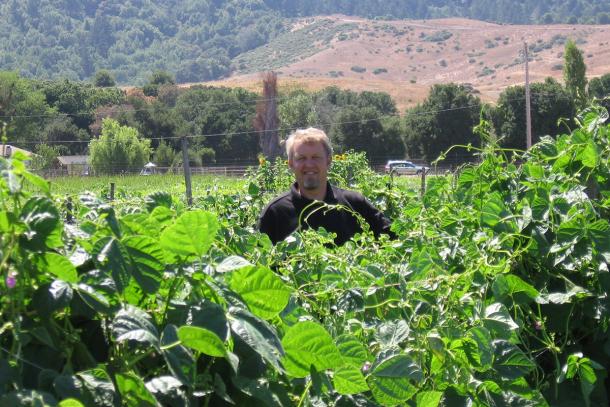
What’s next?
I’m continuing to work in agriculture, but I’m going to be closer to the production side. I’m going to help some farmers sell their product within the modern market-scape. We don’t quite yet recognize the changes happening in California agriculture, but see that there has been a significant upheaval in the distribution system. There’s the standardized pack set by predominantly large ag producers and big buyers, but there’s a lot of area for growth underneath that, from farmers markets to food hubs to CSAs to meal kits. We’re looking at a different distribution system, a more direct system, than before.
It’s hard to change jobs when you’ve done one for so long, but I’ve been lucky to stumble into the produce and agriculture industry, and had the opportunity to have a range of experiences within it. I’d like to believe that this next move is completing a circle or adding another piece to see if I can go more toward the producer end and have an impact there.
I’ve been really lucky to be at one of the best farmers markets, if not (in my opinion) the best. The market has had an impact all over the Bay Area, even so today. I can’t say enough of the customers and sellers, and I feel like I’ve been the lucky one to support them, in that respect.
CUESA will be hosting a goodbye party for Dexter on Saturday, June 4, 12 to 1 pm at the CUESA Classroom. Stop by and reminisce with us!
